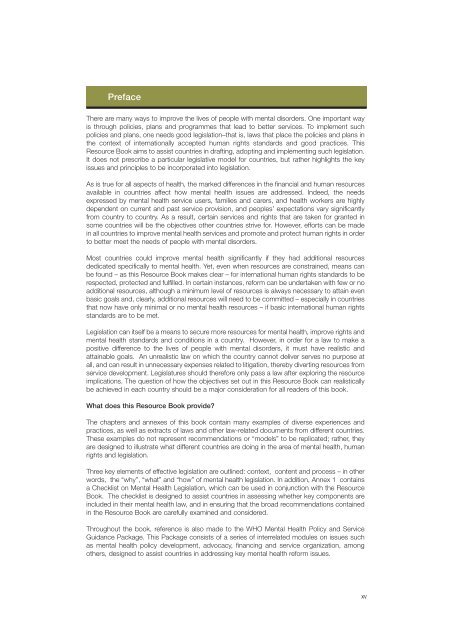human rights and legislation who resource book on mental health
human rights and legislation who resource book on mental health
human rights and legislation who resource book on mental health
Create successful ePaper yourself
Turn your PDF publications into a flip-book with our unique Google optimized e-Paper software.
Preface<br />
There are many ways to improve the lives of people with <strong>mental</strong> disorders. One important way<br />
is through policies, plans <str<strong>on</strong>g>and</str<strong>on</strong>g> programmes that lead to better services. To implement such<br />
policies <str<strong>on</strong>g>and</str<strong>on</strong>g> plans, <strong>on</strong>e needs good <str<strong>on</strong>g>legislati<strong>on</strong></str<strong>on</strong>g>–that is, laws that place the policies <str<strong>on</strong>g>and</str<strong>on</strong>g> plans in<br />
the c<strong>on</strong>text of internati<strong>on</strong>ally accepted <str<strong>on</strong>g>human</str<strong>on</strong>g> <str<strong>on</strong>g>rights</str<strong>on</strong>g> st<str<strong>on</strong>g>and</str<strong>on</strong>g>ards <str<strong>on</strong>g>and</str<strong>on</strong>g> good practices. This<br />
Resource Book aims to assist countries in drafting, adopting <str<strong>on</strong>g>and</str<strong>on</strong>g> implementing such <str<strong>on</strong>g>legislati<strong>on</strong></str<strong>on</strong>g>.<br />
It does not prescribe a particular legislative model for countries, but rather highlights the key<br />
issues <str<strong>on</strong>g>and</str<strong>on</strong>g> principles to be incorporated into <str<strong>on</strong>g>legislati<strong>on</strong></str<strong>on</strong>g>.<br />
As is true for all aspects of <strong>health</strong>, the marked differences in the financial <str<strong>on</strong>g>and</str<strong>on</strong>g> <str<strong>on</strong>g>human</str<strong>on</strong>g> <str<strong>on</strong>g>resource</str<strong>on</strong>g>s<br />
available in countries affect how <strong>mental</strong> <strong>health</strong> issues are addressed. Indeed, the needs<br />
expressed by <strong>mental</strong> <strong>health</strong> service users, families <str<strong>on</strong>g>and</str<strong>on</strong>g> carers, <str<strong>on</strong>g>and</str<strong>on</strong>g> <strong>health</strong> workers are highly<br />
dependent <strong>on</strong> current <str<strong>on</strong>g>and</str<strong>on</strong>g> past service provisi<strong>on</strong>, <str<strong>on</strong>g>and</str<strong>on</strong>g> peoples’ expectati<strong>on</strong>s vary significantly<br />
from country to country. As a result, certain services <str<strong>on</strong>g>and</str<strong>on</strong>g> <str<strong>on</strong>g>rights</str<strong>on</strong>g> that are taken for granted in<br />
some countries will be the objectives other countries strive for. However, efforts can be made<br />
in all countries to improve <strong>mental</strong> <strong>health</strong> services <str<strong>on</strong>g>and</str<strong>on</strong>g> promote <str<strong>on</strong>g>and</str<strong>on</strong>g> protect <str<strong>on</strong>g>human</str<strong>on</strong>g> <str<strong>on</strong>g>rights</str<strong>on</strong>g> in order<br />
to better meet the needs of people with <strong>mental</strong> disorders.<br />
Most countries could improve <strong>mental</strong> <strong>health</strong> significantly if they had additi<strong>on</strong>al <str<strong>on</strong>g>resource</str<strong>on</strong>g>s<br />
dedicated specifically to <strong>mental</strong> <strong>health</strong>. Yet, even when <str<strong>on</strong>g>resource</str<strong>on</strong>g>s are c<strong>on</strong>strained, means can<br />
be found – as this Resource Book makes clear – for internati<strong>on</strong>al <str<strong>on</strong>g>human</str<strong>on</strong>g> <str<strong>on</strong>g>rights</str<strong>on</strong>g> st<str<strong>on</strong>g>and</str<strong>on</strong>g>ards to be<br />
respected, protected <str<strong>on</strong>g>and</str<strong>on</strong>g> fulfilled. In certain instances, reform can be undertaken with few or no<br />
additi<strong>on</strong>al <str<strong>on</strong>g>resource</str<strong>on</strong>g>s, although a minimum level of <str<strong>on</strong>g>resource</str<strong>on</strong>g>s is always necessary to attain even<br />
basic goals <str<strong>on</strong>g>and</str<strong>on</strong>g>, clearly, additi<strong>on</strong>al <str<strong>on</strong>g>resource</str<strong>on</strong>g>s will need to be committed – especially in countries<br />
that now have <strong>on</strong>ly minimal or no <strong>mental</strong> <strong>health</strong> <str<strong>on</strong>g>resource</str<strong>on</strong>g>s – if basic internati<strong>on</strong>al <str<strong>on</strong>g>human</str<strong>on</strong>g> <str<strong>on</strong>g>rights</str<strong>on</strong>g><br />
st<str<strong>on</strong>g>and</str<strong>on</strong>g>ards are to be met.<br />
Legislati<strong>on</strong> can itself be a means to secure more <str<strong>on</strong>g>resource</str<strong>on</strong>g>s for <strong>mental</strong> <strong>health</strong>, improve <str<strong>on</strong>g>rights</str<strong>on</strong>g> <str<strong>on</strong>g>and</str<strong>on</strong>g><br />
<strong>mental</strong> <strong>health</strong> st<str<strong>on</strong>g>and</str<strong>on</strong>g>ards <str<strong>on</strong>g>and</str<strong>on</strong>g> c<strong>on</strong>diti<strong>on</strong>s in a country. However, in order for a law to make a<br />
positive difference to the lives of people with <strong>mental</strong> disorders, it must have realistic <str<strong>on</strong>g>and</str<strong>on</strong>g><br />
attainable goals. An unrealistic law <strong>on</strong> which the country cannot deliver serves no purpose at<br />
all, <str<strong>on</strong>g>and</str<strong>on</strong>g> can result in unnecessary expenses related to litigati<strong>on</strong>, thereby diverting <str<strong>on</strong>g>resource</str<strong>on</strong>g>s from<br />
service development. Legislatures should therefore <strong>on</strong>ly pass a law after exploring the <str<strong>on</strong>g>resource</str<strong>on</strong>g><br />
implicati<strong>on</strong>s. The questi<strong>on</strong> of how the objectives set out in this Resource Book can realistically<br />
be achieved in each country should be a major c<strong>on</strong>siderati<strong>on</strong> for all readers of this <str<strong>on</strong>g>book</str<strong>on</strong>g>.<br />
What does this Resource Book provide?<br />
The chapters <str<strong>on</strong>g>and</str<strong>on</strong>g> annexes of this <str<strong>on</strong>g>book</str<strong>on</strong>g> c<strong>on</strong>tain many examples of diverse experiences <str<strong>on</strong>g>and</str<strong>on</strong>g><br />
practices, as well as extracts of laws <str<strong>on</strong>g>and</str<strong>on</strong>g> other law-related documents from different countries.<br />
These examples do not represent recommendati<strong>on</strong>s or “models” to be replicated; rather, they<br />
are designed to illustrate what different countries are doing in the area of <strong>mental</strong> <strong>health</strong>, <str<strong>on</strong>g>human</str<strong>on</strong>g><br />
<str<strong>on</strong>g>rights</str<strong>on</strong>g> <str<strong>on</strong>g>and</str<strong>on</strong>g> <str<strong>on</strong>g>legislati<strong>on</strong></str<strong>on</strong>g>.<br />
Three key elements of effective <str<strong>on</strong>g>legislati<strong>on</strong></str<strong>on</strong>g> are outlined: c<strong>on</strong>text, c<strong>on</strong>tent <str<strong>on</strong>g>and</str<strong>on</strong>g> process – in other<br />
words, the “why”, “what” <str<strong>on</strong>g>and</str<strong>on</strong>g> “how” of <strong>mental</strong> <strong>health</strong> <str<strong>on</strong>g>legislati<strong>on</strong></str<strong>on</strong>g>. In additi<strong>on</strong>, Annex 1 c<strong>on</strong>tains<br />
a Checklist <strong>on</strong> Mental Health Legislati<strong>on</strong>, which can be used in c<strong>on</strong>juncti<strong>on</strong> with the Resource<br />
Book. The checklist is designed to assist countries in assessing whether key comp<strong>on</strong>ents are<br />
included in their <strong>mental</strong> <strong>health</strong> law, <str<strong>on</strong>g>and</str<strong>on</strong>g> in ensuring that the broad recommendati<strong>on</strong>s c<strong>on</strong>tained<br />
in the Resource Book are carefully examined <str<strong>on</strong>g>and</str<strong>on</strong>g> c<strong>on</strong>sidered.<br />
Throughout the <str<strong>on</strong>g>book</str<strong>on</strong>g>, reference is also made to the WHO Mental Health Policy <str<strong>on</strong>g>and</str<strong>on</strong>g> Service<br />
Guidance Package. This Package c<strong>on</strong>sists of a series of interrelated modules <strong>on</strong> issues such<br />
as <strong>mental</strong> <strong>health</strong> policy development, advocacy, financing <str<strong>on</strong>g>and</str<strong>on</strong>g> service organizati<strong>on</strong>, am<strong>on</strong>g<br />
others, designed to assist countries in addressing key <strong>mental</strong> <strong>health</strong> reform issues.<br />
xv

















